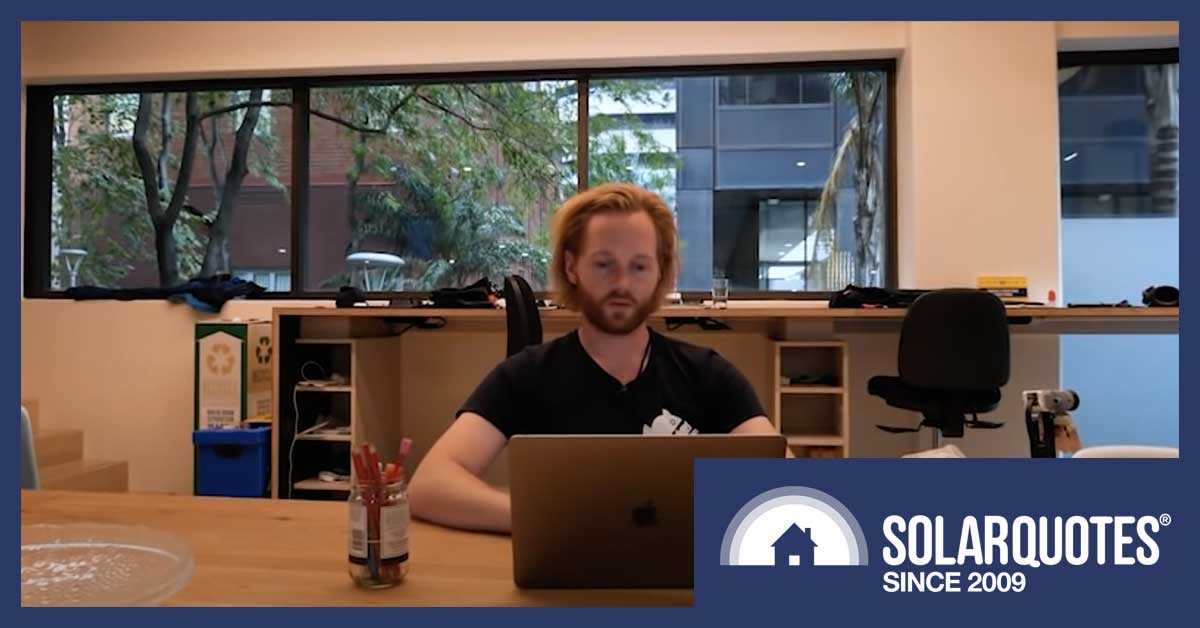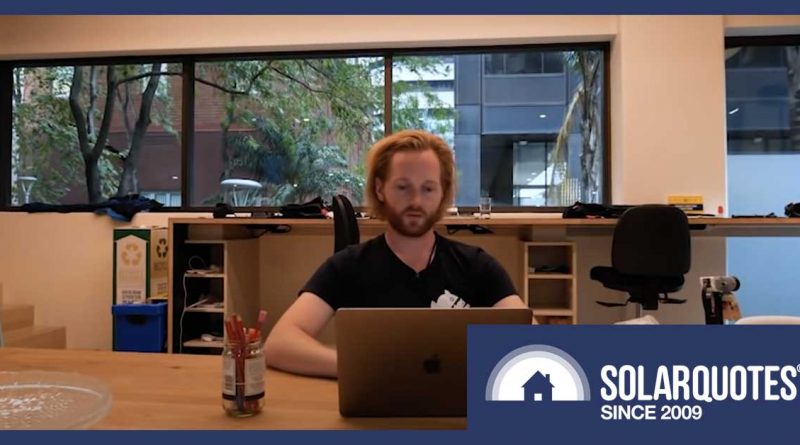How Ned From SolarQuotes Ensures The Integrity Of Our Solar Reviews

SolarQuotes’ Ned Holland hard at work fighting review spam.
What happens on SolarQuotes’ review pages is clearly part of the beating heart of this business, and anyone who has experience with open forums will know what it’s like. There are trolls, people with a grudge (both fair and unfair), honest mistakes, and occasionally dishonest reviews.
When founding SolarQuotes, Finn Peacock knew from the start that the business would depend on having credible, honest reviews. Now, with more than 54,000 reviews of 2,332 solar installation companies published here, that requirement is more imperative than ever.
So, we’d like the chance to give you a glimpse of what’s going on behind the scenes – why and how we do our best to make sure the reviews you read are as true as they can possibly be.
As Finn explained to me, consumers most of all don’t want fake good reviews. They put consumers at risk of hiring a company with bad practices.
As for installers:
“There are two types of reviews that can cause them problems. There are accidentally fake reviews, where people post a review about the wrong business because of confusion over the name.
“I know a car detailer who gets bad reviews on Google, because people confuse them with the dealership next door.”
“Then the other problem in some industries is maliciously fake reviews from competitors.”
Tackling bad reviews is time-consuming and expensive. In the early days of SolarQuotes, Finn was able to handle review moderation and fact-checking himself; then it was handled by Rob.
There are now as many as 40 reviews a day, and verifying all of them has become a full-time job. That’s why Ned Holland joined SolarQuotes two years ago, and most of Ned’s time is devoted to verifying reviews.
Fighting Fakery
“On so many websites, it’s very easy to leave a fake review,” says Ned. “Here at SolarQuotes, it’s quite difficult. It’s possible, but you have to go to great lengths, and I would pick it up quite quickly.”
“Say you are leaving a poor review for an installation that went wrong. You would leave the review on SolarQuotes, and you have the option to leave a proof-of-purchase.”
The proof-of-purchase isn’t published – but it’s the mechanism that lets Ned guarantee that “this person has definitely interacted with this company”.
“Then we get them to leave their phone number, and send them an SMS to verify their review.”
Solar companies leaving spam reviews to damage competitors is a scourge, and one that Ned works hard to combat.
It’s easy to spot if a bunch of reviews emanate from the same IP address, but bad actors know that.
“Sometimes, they use a VPN. But even then, it’s easy to tell if a bunch of people are copy-pasting the same bad review,” he said.
When he spots such patterns, asking for a proof-of-purchase is a simple mechanism to weed out fakes.
Another giveaway is if a bunch of positive reviews mention the same salesperson. That’s often because a solar company has detailed someone to spam SolarQuotes with good reviews, and that salesperson is the one writing the reviews.
Yet another way people try to game the reviews are submissions stating something along the lines of “I got $1,000 off because of this deal” – that’s just a company trying to sneak advertising into the reviews.
There’s another way solar companies will sometimes try to get around the review system: they see a bad review from a customer who had a negative experience, and will try various tactics to get the customer to remove a review.
Those tactics, Ned said, can range from asking the customer to remove the review if the issue can be resolved quietly, all the way up to threatening the customer if they won’t remove a review.
“That isn’t 100 percent transparent, so we need a process to deal with it,” Ned said.
SolarQuotes handles this in two ways.
“If a user asks for their review to be removed … it’s replaced with a big red box saying ‘this review was removed at the user’s request’, so if there’s a bunch on a company’s profile readers can see it happens a lot and draw their own conclusions.”
“If a company alleges a review was fake, but our investigation shows that it wasn’t, we add a text box to the review saying the company asked for removal. It’s a way of making sure that customers get a look at the bigger picture of how the reviews work.”
Authenticity And Defamation
Ned says that so long as SolarQuotes is able to verify the facts in a review, the ideal is to let customers speak in their own words. The “most important rule of my job” is that no solar review is altered unless he’s been in touch with the customer.
The submitter’s “genuinely held opinion” is sacrosanct – something that also intersects with defamation law. Finn explained that from the start, avoiding defamation has been on his mind.
“We really want to get [our customers’] message across, but we want to protect you and we want to protect us. We do put up the critical reviews, but that’s because we have been trained in defamation,” Finn said.
“If a reviewer says ‘Fred Smith is a crook’, that can be a problem! We’ll work with the reviewer to reword their sentiment in a better way, so they can still get their opinion across without exposing them and us to legal heat.”
“Google Reviews won’t ring you up trying to protect you – they’ll just take your review down.”
You can see Ned in action in the latest SolarQuotes TV episode:
Original Source: https://www.solarquotes.com.au/blog/solar-reviews-integrity/


















